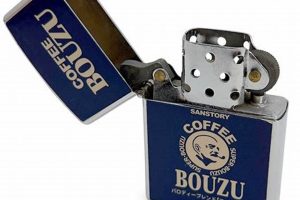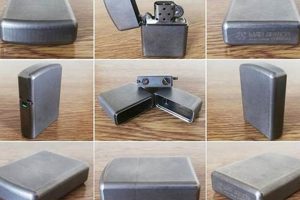Cases for Zippo lighters meeting the Department of Transportation’s regulations for safe transport of flammable materials on aircraft are essential for air travel with these items. These specialized cases typically feature a robust, airtight construction designed to prevent accidental ignition and fuel leakage. An example would be a tightly sealed metal container specifically designed to house a filled Zippo lighter.
The primary benefit of using such a container is the ability to safely and legally transport a filled lighter during air travel. Historically, carrying filled lighters on planes presented a significant fire hazard. Regulations were implemented to mitigate this risk, leading to the development and widespread adoption of these specialized cases. Using a compliant case ensures adherence to safety protocols and avoids potential legal issues or confiscation of the lighter. This contributes to a safer travel environment for all passengers.
Understanding the regulations surrounding the transportation of flammable materials is crucial for travelers. The following sections will delve into the specific DOT requirements, offer guidance on selecting an appropriate carrying case, and explore the broader implications of hazardous materials transport in aviation.
Tips for Safe Transport of Lighters
Transporting lighters safely and legally requires awareness and adherence to established regulations. The following tips offer guidance for ensuring compliance and mitigating potential hazards.
Tip 1: Verify Case Compliance: Confirm the case explicitly states its DOT approval. Look for clear markings or labeling indicating adherence to relevant regulations for the transport of hazardous materials.
Tip 2: Empty and Purge the Lighter: Even with an approved case, it’s recommended to empty the lighter of fuel before travel. Purge any remaining fuel vapors by repeatedly operating the lighter until it no longer produces a flame.
Tip 3: Secure the Lighter within the Case: Ensure the lighter fits snugly within the case to prevent movement and potential ignition during transit. Avoid overfilling the case with multiple lighters or other items.
Tip 4: Place the Case in Carry-on Luggage: Pack the case containing the lighter in carry-on luggage, not checked baggage. This allows for easier inspection and reduces the risk of accidental activation in the cargo hold.
Tip 5: Familiarize with Airline-Specific Regulations: While DOT approval provides a baseline standard, airlines may have additional restrictions. Consult the specific airline’s guidelines regarding the transport of lighters and other hazardous materials.
Tip 6: Declare the Item if Necessary: Some airlines may require passengers to declare the transport of a lighter, even within an approved case. Be prepared to present the case and lighter for inspection upon request.
Adhering to these precautions ensures the safe and legal transportation of lighters, minimizing potential risks and contributing to overall passenger safety. These practices demonstrate responsible handling of potentially hazardous items during air travel.
By understanding and implementing these guidelines, travelers can contribute to a safer and more secure travel environment for everyone. Following these simple steps allows for convenient and worry-free transport of lighters while adhering to all applicable regulations.
1. Safety
Safety represents a paramount concern in the transport of potentially hazardous materials, particularly within the confines of air travel. A “DOT approved Zippo case” directly addresses this concern by providing a secure and compliant method for transporting flammable lighter fluid. The relationship between the case and safety is causal: the case’s design and construction directly mitigate the risks associated with transporting a filled lighter. Specifically, an approved case prevents accidental ignition by containing the lighter within a robust, airtight enclosure. This airtight seal also prevents fuel leakage, eliminating the risk of flammable vapors accumulating within the aircraft cabin or cargo hold. Without such a case, the potential for accidental ignition or fuel spills increases significantly, posing a direct threat to passenger safety. A real-life example could involve a lighter igniting due to pressure changes during flight or leaking fuel creating a flammable environment. The absence of an approved case heightens these risks considerably.
The practical significance of understanding this connection is substantial. Passengers choosing to travel with lighters must recognize the potential dangers associated with improper transport. Utilizing a DOT approved case demonstrates a commitment to safety, not only for the individual but also for fellow passengers and the aircraft itself. Selecting and using an approved case becomes an active step in mitigating potential in-flight hazards. This choice contributes to a safer travel environment, reducing risks and promoting peace of mind for all on board. Ignoring these precautions could have severe consequences, ranging from confiscation of the lighter to, in extreme cases, posing a fire hazard.
In summary, a “DOT approved Zippo case” plays a vital role in ensuring air travel safety. Its design directly addresses the inherent risks associated with transporting flammable materials. Recognizing the causal link between the use of an approved case and enhanced safety underscores the importance of adhering to regulations. The practical application of this understanding translates to responsible travel practices, mitigating potential hazards and contributing to a secure and incident-free flight experience for everyone. Further research into the specific DOT regulations and approved case designs can provide a more comprehensive understanding of this critical safety aspect.
2. Compliance
Compliance with regulations forms the bedrock of safe and legal transport of hazardous materials, particularly within the strictly controlled environment of air travel. A “DOT approved Zippo case” serves as a tangible manifestation of this compliance, ensuring adherence to established safety standards and legal requirements. Understanding the multifaceted nature of compliance in this context is crucial for responsible transport of flammable materials like lighter fluid.
- Regulatory Adherence
Regulatory adherence represents the core principle of compliance. “DOT approved” signifies conformity to the Department of Transportation’s stringent regulations governing the transport of hazardous materials on aircraft. These regulations dictate specific design and construction criteria for cases intended to hold flammable items like lighters. Using an approved case demonstrates adherence to these regulations, allowing legal transport of the lighter. Conversely, using a non-compliant case could lead to confiscation of the item, penalties, or even legal repercussions. An example would be a passenger attempting to board with a lighter in a standard plastic case, which lacks the necessary safety features mandated by the DOT. Such a scenario could result in the lighter being confiscated and potential delays or further complications for the passenger. The implications of regulatory adherence extend beyond individual convenience, contributing to the overall safety and security of air travel.
- Hazard Mitigation
Hazard mitigation represents a critical aspect of compliance, focusing on minimizing potential risks associated with transporting flammable materials. A “DOT approved Zippo case” contributes directly to hazard mitigation through its specific design features. The airtight seal prevents fuel leakage, eliminating the risk of flammable vapors accumulating, while the robust construction protects against accidental ignition due to impact or pressure changes. Consider a scenario where a lighter, stored in a non-compliant case, leaks fuel within checked baggage. The confined space of the cargo hold, combined with the presence of flammable vapors, could create a significant fire hazard. A DOT approved case prevents such scenarios, mitigating the risk and ensuring the safety of the aircraft and its occupants.
- Legal Responsibility
Legal responsibility underscores the individual’s obligation to adhere to regulations regarding hazardous materials transport. Possessing and using a “DOT approved Zippo case” demonstrates a commitment to fulfilling this legal responsibility. Travelers bear the legal responsibility to ensure any hazardous materials they transport comply with applicable regulations. Failing to do so can result in legal consequences, ranging from fines to more severe penalties. For instance, attempting to conceal a lighter in checked baggage without a compliant case could be considered a violation of federal regulations, potentially leading to legal repercussions. Understanding and accepting this legal responsibility is essential for safe and legal travel.
- Universal Application
The principle of compliance extends beyond individual airlines, establishing a universal standard for safe air travel. While specific airlines may have supplementary guidelines, the DOT regulations provide a baseline for acceptable practices regarding hazardous materials. A “DOT approved Zippo case” fulfills this universal requirement, ensuring compliance across different airlines and jurisdictions. This eliminates confusion and ensures consistent application of safety standards across the aviation industry. For example, a passenger traveling with a DOT approved case can be confident that it meets the minimum requirements for safe transport, regardless of the specific airline they are flying with. This consistency reinforces safety protocols and simplifies the process for travelers.
These facets of compliance collectively highlight the crucial role a “DOT approved Zippo case” plays in ensuring safe and legal transport of lighters during air travel. By adhering to these principles, travelers contribute to a secure environment for all, demonstrating a commitment to responsible handling of potentially hazardous materials. This comprehensive approach to compliance strengthens overall aviation safety and fosters a culture of responsible travel practices. Further exploration of specific DOT regulations and their practical applications can provide a deeper understanding of the importance of compliance in this context.
3. Air Travel
Air travel, with its stringent safety regulations, presents unique challenges for transporting potentially hazardous items like lighters. The “DOT approved Zippo case” plays a crucial role in navigating these challenges, enabling passengers to transport lighters safely and legally while adhering to air travel restrictions. Understanding the intersection of air travel regulations and the use of approved cases is essential for responsible and compliant transport of flammable materials.
- Safety Regulations
Stringent safety regulations govern all aspects of air travel, extending to the transport of potentially hazardous materials. These regulations aim to minimize risks and ensure the safety of all passengers and crew. Lighters, containing flammable fuel, fall under these regulations, necessitating the use of specialized containers like “DOT approved Zippo cases.” These cases are designed to prevent accidental ignition and fuel leakage, mitigating potential fire hazards during flight. A real-life example would be the prohibition of loose lighters in checked baggage due to the risk of accidental ignition in the cargo hold. The use of an approved case directly addresses this risk, allowing safe transport within the regulated environment of air travel.
- Checked Baggage Restrictions
Checked baggage restrictions often prohibit the transport of flammable materials, including filled lighters, due to the potential for uncontrolled ignition and fire hazards within the cargo hold. “DOT approved Zippo cases” provide an exception to this rule, allowing for the safe transport of lighters within checked luggage. The case’s airtight and robust construction prevents accidental ignition and fuel leaks, mitigating the risks associated with transporting flammable materials in the cargo hold. For example, a passenger checking a suitcase containing a lighter within a non-compliant container might face confiscation of the item or even legal repercussions. However, using an approved case ensures compliance with regulations, allowing the safe transport of the lighter. This highlights the critical role of approved cases in navigating checked baggage restrictions related to hazardous materials.
- Carry-On Baggage Allowance
While generally permissible, carry-on baggage allowances for lighters often stipulate the use of a “DOT approved Zippo case.” This requirement ensures the safe containment of the lighter and its fuel, minimizing risks within the passenger cabin. The case’s design prevents accidental activation and leakage, addressing potential safety concerns in the close proximity of passengers. For instance, a lighter accidentally igniting within a passenger’s pocket could cause significant harm. However, storing the lighter in an approved case within carry-on luggage mitigates this risk. This illustrates the importance of approved cases in complying with carry-on baggage regulations related to potentially hazardous items.
- International Travel Considerations
International travel often involves navigating varying regulations regarding the transport of hazardous materials. While a “DOT approved Zippo case” generally meets international standards, it is crucial to verify specific regulations for the destination country. Some countries may have additional restrictions or require specific documentation. For example, a passenger traveling internationally with a DOT approved case should confirm the destination country’s regulations regarding lighter transport to ensure compliance. Failure to do so could result in confiscation of the item or other penalties. This highlights the importance of researching and adhering to international regulations when traveling with potentially hazardous materials, even with a DOT approved case.
These facets of air travel regulations underscore the critical role of the “DOT approved Zippo case” in ensuring safe and compliant transport of lighters. By adhering to these regulations and utilizing approved cases, passengers contribute to a secure travel environment for all, demonstrating a commitment to responsible handling of potentially hazardous materials. Understanding these requirements and their practical implications empowers travelers to navigate air travel regulations effectively and safely.
4. Lighter Protection
Lighter protection represents a critical function of a DOT approved Zippo case. The case’s design and construction directly safeguard the lighter from potential hazards inherent in air travel. This protective function is integral to the case’s compliance with DOT regulations, establishing a direct link between lighter protection and regulatory adherence. The relationship is causal: the case’s protective features prevent accidental ignition and fuel leakage, mitigating risks and ensuring compliance with safety standards. Consider a filled lighter subjected to the pressures and impacts associated with baggage handling. Without the protection of a DOT approved case, the lighter could ignite or leak, creating a serious safety hazard. The case’s robust construction and secure closure prevent such incidents, safeguarding both the lighter and the surrounding environment. This protection extends beyond individual safety, contributing to the overall security of air travel.
The practical significance of lighter protection within a DOT approved case is substantial. It enables the safe and legal transport of lighters, items otherwise restricted due to their inherent fire hazard. The case transforms a potentially dangerous item into a safely transportable one, facilitating convenience for travelers while adhering to stringent safety protocols. Imagine a scenario where a traveler needs a lighter upon arrival but cannot transport it safely due to regulations. The approved case solves this dilemma, allowing the traveler to carry the lighter without compromising safety. This practical application underscores the value of lighter protection as a key component of the case’s functionality. Furthermore, the protective features of the case extend beyond air travel, safeguarding the lighter from damage during everyday carry, enhancing its longevity and reliability.
In summary, lighter protection is not merely a feature of a DOT approved Zippo case; it is a fundamental aspect of its design and purpose. This protection ensures compliance with regulations, mitigates potential hazards, and provides practical benefits for travelers. The case’s robust construction safeguards the lighter from damage, enabling safe transport and extending its lifespan. Recognizing the crucial role of lighter protection within the broader context of air travel safety reinforces the importance of adhering to regulations and utilizing approved carrying cases. This understanding contributes to responsible travel practices and a safer, more secure environment for everyone.
5. Leak Prevention
Leak prevention represents a critical safety feature of a DOT approved Zippo case, directly addressing the hazards associated with transporting flammable lighter fluid. The airtight construction of these cases forms a barrier against fuel leakage, mitigating the risk of flammable vapors escaping and potentially igniting. This connection between leak prevention and case design is causal: the airtight seal directly prevents the escape of flammable liquids or vapors, thereby reducing the risk of fire. Consider the potential consequences of a lighter leaking fuel within an aircraft’s cargo hold. The confined space, combined with the presence of flammable vapors, could create a dangerous fire hazard. A DOT approved case, with its robust leak prevention features, eliminates this risk, safeguarding passengers and crew.
The practical implications of leak prevention as a component of a DOT approved Zippo case are substantial. These cases enable the safe and legal transport of filled lighters, items otherwise restricted due to their inherent fire hazard. By containing the fuel within an airtight compartment, the case transforms a potentially dangerous item into one that can be safely transported within the confines of an aircraft. This allows travelers the convenience of carrying a filled lighter without compromising safety regulations. Furthermore, leak prevention features extend the case’s utility beyond air travel. The airtight seal protects the lighter from moisture and debris, preserving its functionality and extending its lifespan. This added benefit enhances the overall value and practicality of the case.
In summary, leak prevention is not merely a desirable feature of a DOT approved Zippo case; it is a fundamental requirement for compliance with safety regulations. This critical feature mitigates fire hazards by preventing fuel leakage, ensuring the safe transport of flammable materials during air travel. The practical benefits extend beyond compliance, enhancing the lighter’s longevity and providing convenience for travelers. Recognizing the crucial role of leak prevention underscores the importance of adhering to regulations and using approved carrying cases for the safe and responsible transport of potentially hazardous items.
6. Durable Construction
Durable construction represents a critical aspect of a DOT approved Zippo case, directly influencing its ability to fulfill its safety function. The case’s structural integrity ensures its effectiveness in protecting the lighter and preventing potential hazards associated with transporting flammable materials during air travel. This robustness is not merely a desirable feature; it is a fundamental requirement for compliance with DOT regulations. The relationship between durable construction and regulatory compliance is causal: a robustly constructed case is more likely to withstand impacts and pressure changes, preventing accidental ignition or fuel leakage and thereby adhering to safety standards.
- Impact Resistance
Impact resistance is a crucial element of durable construction, particularly in the context of air travel where luggage handling can subject items to significant impacts. A DOT approved Zippo case must be capable of withstanding these impacts without compromising its structural integrity or the safety of the contained lighter. Consider a scenario where a suitcase containing a lighter is dropped during baggage handling. A flimsy case might crack or break, potentially exposing the lighter to damage or accidental ignition. A durable, impact-resistant case, however, would protect the lighter, preventing such incidents. This resilience is essential for maintaining safety standards during air travel.
- Pressure Tolerance
Pressure tolerance is another critical aspect of durable construction, especially relevant during air travel where cabin pressure changes can affect contained items. A DOT approved Zippo case must be designed to withstand these pressure fluctuations without deforming or leaking. Changes in air pressure during flight can cause stress on containers. A poorly constructed case might buckle or leak under pressure, potentially releasing flammable fuel. A durable case with adequate pressure tolerance, however, would maintain its integrity, preventing such hazards. This resilience is crucial for ensuring safety throughout the flight.
- Material Integrity
Material integrity refers to the quality and durability of the materials used in constructing the case. A DOT approved Zippo case typically utilizes robust materials like metal or high-impact plastic, chosen for their resistance to wear, tear, and corrosion. These materials contribute to the case’s overall durability, ensuring it can withstand the rigors of travel and continue to provide effective protection for the lighter. A case made from inferior materials might degrade over time, becoming brittle or prone to cracking. This compromises its protective function, increasing the risk of accidental ignition or fuel leaks. The use of high-quality, durable materials is therefore essential for maintaining the case’s long-term effectiveness.
- Secure Closure
A secure closure mechanism is a crucial component of durable construction, ensuring the case remains tightly sealed, preventing accidental opening and fuel leakage. A DOT approved Zippo case features a robust closure, often a strong latch or screw-on cap, designed to withstand impacts and pressure changes without compromising its seal. A loose or faulty closure could allow the lighter to escape or fuel to leak, creating a potential fire hazard. A secure closure mechanism mitigates this risk, maintaining the integrity of the containment and ensuring compliance with safety regulations. This feature is vital for preventing accidental ignition and maintaining a safe environment during air travel.
These facets of durable construction collectively contribute to the overall safety and compliance of a DOT approved Zippo case. The case’s robust design and construction ensure it can withstand the rigors of air travel, protecting the lighter and preventing potential hazards. This durability is not merely a desirable attribute; it is a fundamental requirement for meeting DOT regulations and ensuring the safe transport of flammable materials. Choosing a case with demonstrably durable construction is essential for responsible and compliant air travel with a Zippo lighter. This choice reflects a commitment to safety and adherence to regulations, contributing to a secure travel environment for all.
7. Regulation Adherence
Regulation adherence forms the cornerstone of safe and legal transport of hazardous materials, especially within the strictly regulated environment of air travel. A “DOT approved Zippo case” embodies this principle, signifying conformity to stringent safety standards established by the Department of Transportation. Understanding the multifaceted nature of regulation adherence in this context is crucial for responsible handling and transport of flammable materials like lighter fluid. This section explores the key facets of regulation adherence as they relate to “DOT approved Zippo cases.”
- Legal Compliance
Legal compliance represents the foundational aspect of regulation adherence. “DOT approved” signifies that the case meets specific legal requirements mandated by the Department of Transportation for the transport of hazardous materials on aircraft. These regulations dictate design features, construction materials, and testing procedures to ensure the case effectively contains flammable substances and prevents accidental ignition. Using a DOT approved case demonstrates compliance with these legal obligations, allowing for the legal transport of a filled lighter. Conversely, using a non-compliant case could result in penalties, confiscation of the item, and potential legal repercussions. For instance, attempting to board an aircraft with a lighter in a standard plastic container, which lacks the required safety features mandated by DOT regulations, could lead to confiscation and potential legal action. This underscores the importance of legal compliance in ensuring safe and legal transport of hazardous materials.
- Standardized Safety
Standardized safety protocols are essential for mitigating risks associated with hazardous materials transport. DOT regulations establish a standardized set of safety requirements for cases designed to hold flammable items like lighters. These standards ensure consistency and predictability in safety measures across the aviation industry. A “DOT approved Zippo case” adheres to these standardized protocols, providing a reliable level of safety and reducing the likelihood of accidents. Imagine a scenario where each airline implemented its own, potentially conflicting, regulations for lighter transport. This inconsistency would create confusion and potentially compromise safety. Standardized DOT regulations, reflected in the “DOT approved” designation, ensure a consistent level of safety across all airlines and jurisdictions.
- Industry Accountability
Regulation adherence fosters accountability within the manufacturing and transportation industries. Manufacturers of “DOT approved Zippo cases” are responsible for ensuring their products meet stringent safety standards. This accountability promotes rigorous quality control and testing procedures, resulting in safer and more reliable products. Airlines, too, play a role in enforcing these regulations, ensuring passengers comply with hazardous materials transport guidelines. This shared responsibility between manufacturers and transportation providers strengthens the overall safety framework of air travel. For example, a manufacturer producing non-compliant cases could face legal repercussions and damage to their reputation. This accountability incentivizes adherence to regulations and promotes a culture of safety within the industry.
- Public Safety Assurance
Regulation adherence provides a crucial assurance of public safety, minimizing potential risks associated with transporting hazardous materials. The “DOT approved” designation on a Zippo case signifies that the product has undergone rigorous testing and meets established safety standards. This provides passengers with confidence that the case effectively contains flammable materials and minimizes the risk of accidents. This assurance contributes to a safer and more secure travel environment for everyone. Consider the potential consequences if passengers were uncertain about the safety of items transported on aircraft. This uncertainty could erode public trust and create anxiety surrounding air travel. The “DOT approved” designation provides a tangible assurance of safety, fostering confidence and promoting peace of mind for passengers.
These facets of regulation adherence collectively highlight the crucial role a “DOT approved Zippo case” plays in ensuring the safe and legal transport of lighters during air travel. By adhering to these regulations, manufacturers, airlines, and passengers contribute to a secure environment for all, demonstrating a shared commitment to responsible handling of potentially hazardous materials. This comprehensive approach to regulation adherence strengthens the overall safety framework of aviation and fosters a culture of responsible travel practices. Further exploration of specific DOT regulations and their practical implications can provide a deeper understanding of the importance of regulation adherence in the broader context of hazardous materials transport.
Frequently Asked Questions
This section addresses common inquiries regarding DOT approved Zippo cases, providing clarity on regulatory compliance, safety considerations, and practical usage.
Question 1: What designates a Zippo case as “DOT approved”?
Specific markings and labeling indicate compliance with Department of Transportation regulations for transporting hazardous materials. These markings typically include a certification statement and may specify the applicable regulations. Absence of such markings suggests non-compliance.
Question 2: Are DOT approved cases required for all forms of transportation?
While essential for air travel, regulations for other modes of transport, such as ground or maritime, may vary. Consulting specific regulations for each mode is recommended. Focus remains on preventing accidental ignition and fuel leakage.
Question 3: Can any Zippo lighter be carried in a DOT approved case?
Generally, yes. However, ensuring the lighter fits securely within the case is crucial to prevent movement and potential ignition during transit. Overfilling the case with multiple lighters or other items is discouraged.
Question 4: Does a DOT approved case guarantee acceptance by all airlines?
While DOT approval provides a baseline standard, airlines may have additional, specific restrictions. Consulting individual airline guidelines before travel is advised. This ensures preparedness for any specific requirements.
Question 5: Should a lighter be emptied even when stored in a DOT approved case?
Emptying and purging the lighter of fuel before travel, even with an approved case, is a recommended safety precaution. This minimizes the risk of accidental ignition and fuel leakage during transit.
Question 6: Where can one acquire a DOT approved Zippo case?
Reputable retailers specializing in tobacco products or travel accessories often stock DOT approved cases. Online marketplaces also offer a wide selection. Verification of DOT compliance before purchase remains crucial.
Understanding these aspects of DOT approved Zippo cases promotes safe and compliant transport of flammable materials during air travel. Adherence to regulations ensures not only personal safety but also the safety of fellow passengers and crew.
The following section delves further into practical tips for safe lighter transport, offering additional guidance for ensuring a smooth and compliant travel experience.
DOT Approved Zippo Case
Exploration of “DOT approved Zippo case” reveals the critical intersection of safety, compliance, and practicality within air travel regulations. Durable construction, leak prevention, and impact resistance are not merely desirable features but essential components ensuring safe transport of flammable materials. Adherence to these regulations, embodied by the “DOT approved” designation, safeguards individual travelers, fellow passengers, and aircraft personnel. Understanding the significance of using compliant carrying cases contributes to a safer, more secure travel environment for all.
Transporting hazardous materials requires diligent adherence to established safety protocols. Selecting and utilizing a DOT approved Zippo case demonstrates a commitment to these principles, fostering a culture of responsible travel practices. Continued awareness and adherence to evolving regulations remain crucial for maintaining the highest safety standards within the aviation industry. Prioritizing safety through informed choices ensures the well-being of all travelers and reinforces the integrity of air travel as a safe and reliable mode of transportation.







